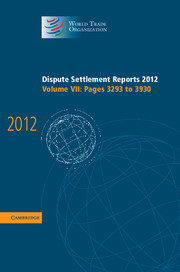Book contents
- Frontmatter
- TABLE OF CONTENTS
- CHINA – MEASURES RELATED TO THE EXPORTATION OF VARIOUS RAW MATERIALS
- Contents
- CASES CITED IN THESE REPORTS
- ABBREVIATIONS USED IN THESE REPORTS
- I INTRODUCTION
- II ARGUMENTS OF THE PARTICIPANTS AND THE THIRD PARTICIPANTS
- III ISSUES RAISED ON APPEAL
- IV THE PANEL'S TERMS OF REFERENCE
- V THE PANEL'S RECOMMENDATIONS
- VI APPLICABILITY OF ARTICLE XX
- VII ARTICLE XI:2(a) OF THE GATT 1994
- VIII ARTICLE XX(g) OF THE GATT 1994
- IX FINDINGS AND CONCLUSIONS IN THE APPELLATE BODY REPORT WT/DS394/AB/R
- X FINDINGS AND CONCLUSIONS IN THE APPELLATE BODY REPORT WT/DS395/AB/R
- XI FINDINGS AND CONCLUSIONS IN THE APPELLATE BODY REPORT WT/DS398/AB/R
- ANNEX I Request for the Establishment of a Panel by the United States, WT/DS394/7
- ANNEX II Request for the Establishment of a Panel by the European Communities, WT/DS395/7
- ANNEX III Request for the Establishment of a Panel by Mexico, WT/DS398/6
- ANNEX IV Notification of an Appeal by China, WT/DS394/11, WT/DS395/11, WT/DS398/10
- ANNEX V Notification of an Other Appeal by the United States, WT/DS394/12
- ANNEX VI Notification of an Other Appeal by the European Union, WT/DS395/12
- ANNEX VII Notification of an Other Appeal by Mexico, WT/DS398/11
- Contents
- TABLE OF WTO CASES CITED IN THESE REPORTS
- GATT DISPUTE SETTLEMENT AND WORKING PARTY REPORTS
- ABBREVIATIONS OF MEASURES, EVIDENCE, AND OTHER INSTRUMENTS REFERRED TO IN THIS RULING
- TABLE OF ABBREVIATIONS
- I INTRODUCTION
- II FACTUAL ASPECTS
- III PARTIES' REQUESTS FOR FINDINGS AND RECOMMENDATIONS
- IV ARGUMENTS OF THE PARTIES
- V ARGUMENTS OF THE THIRD PARTIES
- VI INTERIM REVIEW
- VII FINDINGS
- VIII CONCLUSIONS AND RECOMMENDATIONS
- Cumulative List of Published Disputes
VI - APPLICABILITY OF ARTICLE XX
from CHINA – MEASURES RELATED TO THE EXPORTATION OF VARIOUS RAW MATERIALS
Published online by Cambridge University Press: 03 January 2018
- Frontmatter
- TABLE OF CONTENTS
- CHINA – MEASURES RELATED TO THE EXPORTATION OF VARIOUS RAW MATERIALS
- Contents
- CASES CITED IN THESE REPORTS
- ABBREVIATIONS USED IN THESE REPORTS
- I INTRODUCTION
- II ARGUMENTS OF THE PARTICIPANTS AND THE THIRD PARTICIPANTS
- III ISSUES RAISED ON APPEAL
- IV THE PANEL'S TERMS OF REFERENCE
- V THE PANEL'S RECOMMENDATIONS
- VI APPLICABILITY OF ARTICLE XX
- VII ARTICLE XI:2(a) OF THE GATT 1994
- VIII ARTICLE XX(g) OF THE GATT 1994
- IX FINDINGS AND CONCLUSIONS IN THE APPELLATE BODY REPORT WT/DS394/AB/R
- X FINDINGS AND CONCLUSIONS IN THE APPELLATE BODY REPORT WT/DS395/AB/R
- XI FINDINGS AND CONCLUSIONS IN THE APPELLATE BODY REPORT WT/DS398/AB/R
- ANNEX I Request for the Establishment of a Panel by the United States, WT/DS394/7
- ANNEX II Request for the Establishment of a Panel by the European Communities, WT/DS395/7
- ANNEX III Request for the Establishment of a Panel by Mexico, WT/DS398/6
- ANNEX IV Notification of an Appeal by China, WT/DS394/11, WT/DS395/11, WT/DS398/10
- ANNEX V Notification of an Other Appeal by the United States, WT/DS394/12
- ANNEX VI Notification of an Other Appeal by the European Union, WT/DS395/12
- ANNEX VII Notification of an Other Appeal by Mexico, WT/DS398/11
- Contents
- TABLE OF WTO CASES CITED IN THESE REPORTS
- GATT DISPUTE SETTLEMENT AND WORKING PARTY REPORTS
- ABBREVIATIONS OF MEASURES, EVIDENCE, AND OTHER INSTRUMENTS REFERRED TO IN THIS RULING
- TABLE OF ABBREVIATIONS
- I INTRODUCTION
- II FACTUAL ASPECTS
- III PARTIES' REQUESTS FOR FINDINGS AND RECOMMENDATIONS
- IV ARGUMENTS OF THE PARTIES
- V ARGUMENTS OF THE THIRD PARTIES
- VI INTERIM REVIEW
- VII FINDINGS
- VIII CONCLUSIONS AND RECOMMENDATIONS
- Cumulative List of Published Disputes
Summary
270. In this section, we address China's claim that Article XX of the GATT 1994 is available as a defence to China in relation to export duties found to be inconsistent with China's obligations under Paragraph 11.3 of China's Accession Protocol.
The Panel's Findings
271. The Panel began its interpretation of Paragraph 11.3 of China's Accession Protocol by observing that Paragraph 11.3 “does not include any express reference to Article XX of the GATT 1994, or to provisions of the GATT 1994 more generally”. In so doing, the Panel drew a contrast between the text of Paragraph 11.3 and the language contained in Paragraph 5.1 of China's Accession Protocol—”without prejudice to China's right to regulate trade in a manner consistent with the WTO Agreement”—which the Appellate Body examined in China – Publications and Audiovisual Products. In particular, the Panel noted that Paragraph 11.3 contains only a “specific set of exceptions: those covered by Annex 6 and those covered by GATT Article VIII”. For the Panel, the language in Paragraph 11.3, together with the “omission of general references to the WTO Agreement or to the GATT 1994”, suggest that WTO Members did not intend to incorporate the defences available under Article XX into Paragraph 11.3.540 The Panel also found no support in the provisions of China's Accession Working Party Report for the proposition that China could invoke Article XX of the GATT 1994 to justify violations of Paragraph 11.3 of China's Accession Protocol.
- Type
- Chapter
- Information
- Dispute Settlement Reports 2012 , pp. 3414 - 3428Publisher: Cambridge University PressPrint publication year: 2014



